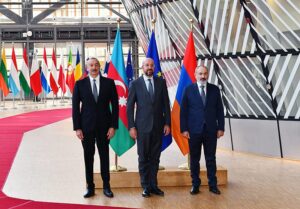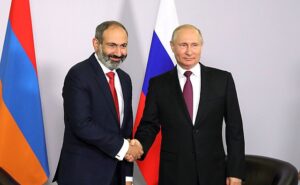A Pashinian poster on a car in Yerevan, 2018 (source: WikiMedia Commons)
Armenian police have detained hundreds of protesters who gathered in Yerevan to demonstrate against the government’s ongoing negotiations with neighboring Azerbaijan over the Nagorno-Karabakh region, which was the stage of a brief war between both countries in 2020. The protests commenced on May 1, at the central ‘France Square’ in Yerevan, later spreading to other provincial cities. Protesters call on PM Nikol Pashinian to step down as they oppose concessions to Azerbaijan regarding Nagorno-Karabakh – Pashinian seems to be prepared to accept mutual recognition of territory. In recent days, the protests seemed to have gained momentum as major opposition leaders have joined.
Ongoing negotiations
Since the devastating 2020 war in Nagorno-Karabakh, tensions remained over negotiations with Azerbaijan, in which de facto took territory in the fierce conflict. At the time, Russia brokered a cease-fire, ensured by Russian forces in the region. However, these have come under pressure as they have been relocated due to the Russian invasion of Ukraine, causing tensions to flare up at the beginning of 2022 again.
Since last month, Azerbaijan and Armenia are negotiating a new peace deal, mediated by western powers. On April 7, 2022, Pashinian and Azerbaijani President Aliyev met in Brussels alongside European Council President Charles Michel. Lately, progress has been made in the peace talks, with both parties seemingly ready to make concessions. Baku requests a mutual recognition of each other’s territorial integrity – Pashinian said this was acceptable for his government. In an April 13 speech, he had also said that the international community pressures Armenia to “lower the bar a bit on Nagorno-Karabakh’s status” – angering many in Armenia.
More than 200 detained
On May 2, Armenian police detained 244 protesters who were obstructing traffic in Yerevan. Protesters chanted “Armenia without Turks”, referencing an opposition slogan that branded Pashinian “a Turk” during last year’s election campaign. Activists have described the police force as brutal, using excessive violence.
The role of the opposition
These protests seem to be organized by the Armenian opposition, which is composed of the political elite that ruled Armenia for years before Pashinian. On May 1, former Armenian PM Serzh Sargsyan attended the protests. He was asked about the Karabakh negotiations, saying: “for 10 years, the international community was saying that Artsakh (an alternate Armenian name for the territory) must have self-determination. Do not pay attention to what he is saying.” Ishkhan Saghatelyan, leader of the opposition party Armenian Revolutionary Federation, and vice speaker in the parliament called upon people to rally. “I call on everyone to begin strikes. I call on students not to attend classes. Traffic will be completely blocked in the center of Yerevan.”
For now, these protests do not seem to have the same potential as the 2018 mass protests that brought Pashinian into power at the expense of the current opposition. The Armenian opposition has become unpopular due to their years in power – and these protests are seemingly a vehicle for them to return to their former role.
Geopolitics
The Russian invasion of Ukraine has had its effects on Armenia and Azerbaijan. Armenia, geopolitically isolated in the Caucasian region, sees Russia as an important ally. However, as Russia fully focuses on the war in Ukraine, the Moscow-brokered peace deal has come under pressure in Nagorno-Karabakh. Azerbaijan sees possibilities to broker a new peace deal, in which conquered territories become internationally recognized. Moreover, western powers such as France, the US and the EU see influence too. They have now taken the lead in peace deal negotiations, that took place in Brussels. Undoubtedly, this will lead to an irritated Kremlin seeking new forms of authority over the region. As these large-scale protests develop, it is crucial that these do not stand in the way of peace and stability in the region.
Sources: Al Jazeera France24 Euronews Radio Free Europe
Photo: WikiMedia Commons



